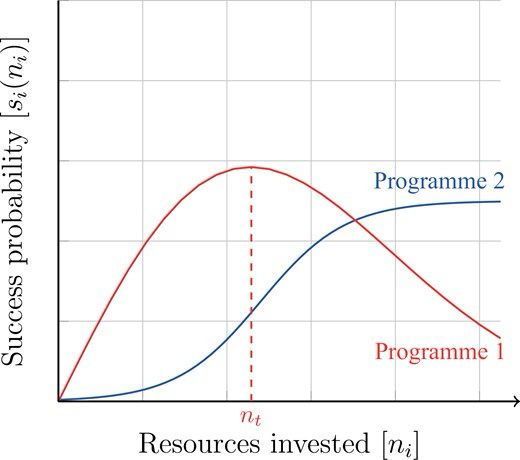The project is on consensus in science -- when it's a reliable sign of truth, how to use it in science communication, and how to progress science via consensus. We'll be hiring two postdocs and two MA-students, hosting several events, and be doing lots of exciting collaborative research!
12.02.2026 23:04 — 👍 3 🔁 0 💬 1 📌 0

Allocation from the Icelandic Research Fund for the financial year 2026 | The Icelandic Centre for Research
The Board of The Icelandic Research Fund has completed the allocation of grants for new research projects for 2026. A total of 414 valid applications were received, 70 of which were funded, or 17%.
Some professional news: I'm delighted to share that I've been awarded a "grant of excellence" from the Icelandic Research Fund (Rannís). This is the largest type of research grant that's available in Iceland; only a couple of these are awarded each year across all disciplines.
12.02.2026 23:03 — 👍 4 🔁 1 💬 1 📌 0
#philsky #philsci
27.12.2025 11:42 — 👍 2 🔁 0 💬 0 📌 0
Inferring to the Best Explanation from Uncertain Evidence | Philosophy of Science | Cambridge Core
Inferring to the Best Explanation from Uncertain Evidence
Although this wasn't our goal, I was extra pleased that our results end up largely vindicating a suggestion I had made in a previous paper, which I called Evidentially Robust IBE. doi.org/10.1017/psa....
27.12.2025 11:41 — 👍 0 🔁 0 💬 0 📌 0

Testing abductions from uncertain evidence
Abstract. Inference to the Best Explanation (IBE) is traditionally conceived of as a rule of inference, in which one infers to the hypothesis that provides
@boruttrpin.bsky.social and I have a new paper out in Philosophical Quarterly. We had both written on how inference to the best explanation could work with uncertain evidence. So we teamed up to test some suggestions for how to do that using computer simulations: academic.oup.com/pq/article/d...
27.12.2025 11:39 — 👍 23 🔁 7 💬 2 📌 0

Me in a red jumper talking into a mic and holding my hand up. Behind me is a slide with the words "You tell me I am wrong. // Who are you, who is anybody, to tell me I am wrong? // I am not wrong."
Finnur Dellsén got a nice pic of me on my standard Q&A slide, so now I have a stock reply to any time anyone disagrees with me.
07.11.2025 10:22 — 👍 623 🔁 47 💬 20 📌 6

A speaker (Helen Longino) giving a talk to an audience, standing behind a lectern and in front a lecture slides with pictures of lichens and dodders
Helen Longino giving the first Annual Institute of Philosophy and Duke University Research Talk at the University of Iceland! The talk was titled “Why Center Interaction? (In science and elsewhere)”
08.10.2025 19:59 — 👍 21 🔁 1 💬 1 📌 0
It's definitely a good one! I also like what Einstein says somewhere about internal and external considerations in favor of a theory (or something to that effect). Fits IBE quite well, I think.
12.09.2025 20:39 — 👍 1 🔁 0 💬 0 📌 0
Sounds great, I look forward to reading this.
12.09.2025 20:37 — 👍 0 🔁 0 💬 0 📌 0
Inferring to the Best Explanation from Uncertain Evidence | Philosophy of Science | Cambridge Core
Inferring to the Best Explanation from Uncertain Evidence
A weirdly underappreciated problem about Inference to the Best Explanation is how it can handle uncertain evidence. This new paper, now forthcoming in Philosophy of Science, proposes a strategy for doing that (and argues that Einstein may have used it). #philsky #philsci
doi.org/10.1017/psa....
12.09.2025 11:20 — 👍 25 🔁 10 💬 3 📌 0
Scientific Progress, Astrobiology and the Pursuit of Knowledge | Philosophy of Science | Cambridge Core
Scientific Progress, Astrobiology and the Pursuit of Knowledge
Curious why my latest paper left one notable astrobiologist "unpleasantly surprised"? Follow the link and you might just find out! #philsci #philsky #astrobiology www.cambridge.org/core/journal...
08.09.2025 10:55 — 👍 6 🔁 2 💬 0 📌 0
And we argue, on that basis, that the debate about scientific progress should be seen as central to the various debates about scientific realism.
20.08.2025 17:45 — 👍 5 🔁 0 💬 0 📌 0
We show, among other things, that scientists' views about various forms of scientific realism are best predicted by their views on scientific progress -- as opposed to, for instance, their views on the epistemic status of current theories, the no-miracles argument, or the pessimistic induction.
20.08.2025 17:40 — 👍 5 🔁 0 💬 1 📌 0
Research Talk in Philosophy: James R. Beebe
Tomorrow at U. of Iceland: James Beebe talks about how and ehy to make epistemic autonomy reflective. #philsky
english.hi.is/research-tal...
20.08.2025 06:47 — 👍 2 🔁 0 💬 0 📌 0

This is hilarious, and makes a good point.
15.08.2025 03:06 — 👍 7 🔁 2 💬 1 📌 1
There was some sort of transition from one paper handling system to another, during which my paper seems to have just been forgotten about for a good while. Phil Imprint is doing the best they can with very limited resources so I have lots of sympathy for them.
14.08.2025 20:47 — 👍 0 🔁 0 💬 1 📌 0
In the paper I argue for the heretical view that there is a way in which accommodated data provides more support than predicted data.
How could that possibly be right? Read the paper to find out. (It's fully open access.)
14.08.2025 18:56 — 👍 2 🔁 0 💬 0 📌 0
I wasn't able to make thismone open access. Preprint available here: philpapers.org/archive/BEDI...
06.08.2025 10:45 — 👍 3 🔁 0 💬 0 📌 0

Inclusive inquiry
What is the point of inquiry? Some say that the aim of inquiring into some question is to come to know its answer; others, that the aim is to attain justified belief, epistemic improvement, or some o...
New paper now forthcoming in PPR, co-authored with Bob Beddor.
Argues that inquiry, especially in science, needs to be construed as a more social/egalitarian endeavor: the point of inquiring is often to confer epistemic benefits on others. #philsky #philsci
onlinelibrary.wiley.com/doi/10.1111/...
06.08.2025 10:43 — 👍 24 🔁 5 💬 1 📌 0
And although we frame the argument as focusin on methods in philosophy specifically, it easily generalizes to other disciplines, and indeed to any systematic research.
30.07.2025 17:07 — 👍 2 🔁 0 💬 0 📌 0
The model we use to show this is a sort of extension/elaboration/improvement on the models that Kitcher and Strevens use to model the benefits of cognitive diversity in science.
30.07.2025 17:05 — 👍 2 🔁 0 💬 0 📌 0
Should every researcher (in philosophy, for instance) be using the 'best' method available? We show, from surprisingly modest assumptions (e.g. about what 'best' amounts to), that resources should often be spread around to those using other methods, even when we know they're not 'best'.
30.07.2025 17:04 — 👍 8 🔁 0 💬 0 📌 1

Mass starvation spreads across Gaza | MSF
More than 100 organisations are sounding the alarm to allow lifesaving aid into Gaza.
#Gaza is often described as an open-air prison. That analogy is no longer accurate: prisoners are not systematically shot, bombed, and starved to death.
Gaza is now an open-air death camp.
23.07.2025 14:02 — 👍 8 🔁 4 💬 0 📌 1

ABSTRACT. Around 97% of climate scientists endorse anthropogenic global warming (AGW), the theory that human activities are partly responsible for recent increases in global average temperatures. Clearly, this widespread endorsement of AGW is a reason for non-experts to believe in AGW. But what is the epistemic significance of the fact that some climate scientists do not endorse AGW? This article contrasts expert unanimity, in which virtually no expert disagrees with some theory, with expert consensus, in which some non-negligible proportion either rejects or is uncertain about the theory. It is argued that from a layperson’s point of view, an expert consensus is often stronger evidence for a theory’s truth than unanimity. Several lessons are drawn from this conclusion, for example, concerning what laypeople should infer from expert pronouncements, how journalists should report on scientific theories, and how working scientists should communicate with the public.
New issue, new Editors' Choice article (free to read):
Finnur Dellsén,
‘Consensus versus Unanimity: Which Carries More Weight?’
Read it here: www.journals.uchicago.edu/doi/10.1086/...
#philsci #philsky #hps
18.06.2025 09:15 — 👍 9 🔁 3 💬 0 📌 0

Quality of scientific papers questioned as academics ‘overwhelmed’ by the millions published
Widespread mockery of AI-generated rat with giant penis in one paper brings problem to public attention
Many good and interesting points made here, including the final point about research papers soon being written by AIs, reviewed by AIs, and then subsequently summarized for us by AIs. At some point we'll need to rethink the current model of the ~10k word research article. #philsci #philsky
21.07.2025 20:30 — 👍 10 🔁 5 💬 2 📌 0
The Centre for Logic and Philosophy of Science (CLPS) at the Institute of Philosophy (@kuleuvenuniversity.bsky.social) focuses on #logic and #philsci, with a concentration on the philosophies of the special sciences • https://hiw.kuleuven.be/clps #philsky
The unofficial account of RÚV English.
English language service of Iceland's national broadcaster, RÚV. Home of RÚV English Radio & news from Iceland. Idea for a programme, etc? Email english@ruv.is
🔗 ruv.is/english
👨🏻💻 Admin: @apaulo11.bsky.social
Writer, philosopher, teacher, dad, lapsed runner. Ethics, conflict, epistemology, language, metaphysics, mind, research methods. Interested in where the deepest questions in philosophy bump up against the most mundane experiences in ordinary life.
Gústav Adolf Bergmann Sigurbjörnsson.
Heimspekingur og allskonar!
Philospher and stuff!
Middle-aged nerdy feminist philosopher
Philosopher of science. AoS: Sci method, theory choice, prediction & explanation. History of science. XPhi & metaphilosophy. Assoc Prof. Dad of 2 little ones.
Currently doing research on scientific discovery in AI-augmented labs. #ERCCoG TINT/UniHelsinki. #Philsci #Cogsci #Scisci / European Network for the Science of Science (www.euroscisci.net) / Institutional epistemology WS. Failed musician. 90s BBS sysop.
Physics, philosophy, complexity. @jhuartssciences.bsky.social & @sfiscience.bsky.social. Host, #MindscapePodcast. Married to @jenlucpiquant.bsky.social.
Latest books: The Biggest Ideas in the Universe.
https://preposterousuniverse.com/
Philosophy professor born in Kansas and working in Singapore
Professor of Practical Philosophy at Stockholm University. I create theoretical structures. Views expressed mine. Glass is only half empty.
Postdoctoral Research Fellow at the Philosophical Progress Lab, University of Iceland. My research concerns the intersection of metaphysics, epistemology and philosophy of science. Details can be found here: https://nicholasemmersonphilosophy.weebly.com.
News and updates from the Munich Center for Mathematical Philosophy at LMU Munich. Disclaimer: reposts and likes are not endorsements.
Professor of Philosophy and Decision Theory, LMU Munich. Co-Director of the Munich Center for Mathematical Philosophy. Account used for academic purposes. Further info at: https://christianlist.net/
Philosopher (Social Epistemology, Philosophy of Science and Technology)
Professor at TU Berlin
President, German Society for Philosophy of Science (GWP)
Philosopher (social and applied epistemology, social media, misinformation, conspiracy theories)
Dog poster
Philosopher working on AI ethics and epistemology. Also a socialist and a metalhead, but sadly much more boring than that might suggest.
https://www.willfleisher.net
Philosopher of Science | JProf at TU Dresden | ennofischer.weebly.com
phd in philosophy, working on epistemology and philosophy of science
@ university of maribor, slovenia
Langveikt heimspekikvenz, fertug kjelling í blokk, tveggja barna ma&pa með mínum ektamanni. Elska fjöll en klíf þau ekki.
Chronically ill philosopher-woman, forty years old in a block, moma of two raising them up with my man.
Programmer who is also a jazz guitarist! Father of two wonderful little people.











